Julie Musil's Blog, page 7
July 9, 2014
Bestselling Author Jody Hedlund on Research Trips--Plus a Giveaway!

Friends, today I'm honored to have award-winning, bestselling author Jody Hedlund here to tell us about her research trip for her latest release, Captured by Love. (Btw, I recently finished her book, and will share writing lessons learned in the near future)
Take it away, Jody!
Behind the Scenes of Captured by LoveA Research Trip to Mackinac Island (Part 1)Research is an integral part of writing historical novels. Obviously there are many ways to research including reading biographies, studying time-period books, finding original journals or documents from that era, and reading other novels or watching movies about the topic (and then analyzing them). Those are all critical and important ways to research for a novel. Another way I like to research is by taking trips to the location of my books. While a trip is a helpful and fun way to glean more information for my stories, I don't consider those trips to be quite as crucial as the other kind of research I mentioned. Yes, trips can be helpful. But usually SO much has changed in one hundred and fifty years, that it's difficult to "see" the location as it would have been at the time of the story. Buildings, landmarks, vegetation, and physical geography (like coast lines, rock formations, clearings) have changed, sometimes even drastically.Nevertheless, whenever possible, I try to go visit the settings of my books. I'm still able to glean tidbits about weather, some local history, and even sensory details about the place that add authenticity to a story.
When it came time to plan a research trip for Captured by Love, I was really excited. It had been several years since I'd visited Mackinac Island in the Upper Peninsula of Michigan, and I was eager for an excuse to go back! I asked my mom and two older daughters if they'd like to go with. And I really had to twist their arms to go! *wink!*
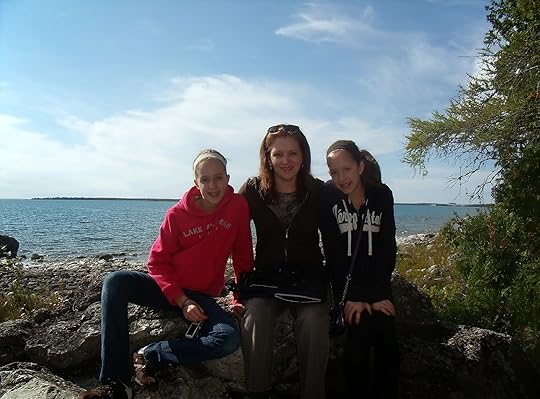
As time would have it, the trip had to wait until the end of September. But that actually ended up being a beautiful time to drive north because the leaves were just beginning to change. That meant we were greeted by vibrant shades of yellow, orange, and magenta as we drove the three hours from my home in the central part of the state, crossed the five-mile-long Mackinac Bridge, and entered the Upper Peninsula of Michigan.Mackinac Island is only accessible by boat and no motorized vehicles are allowed on the island. Many visitors bring their bikes along and others rent bikes when they arrive. There is also the option of taking horse-drawn carriage rides, which was our preferred mode of transportation.
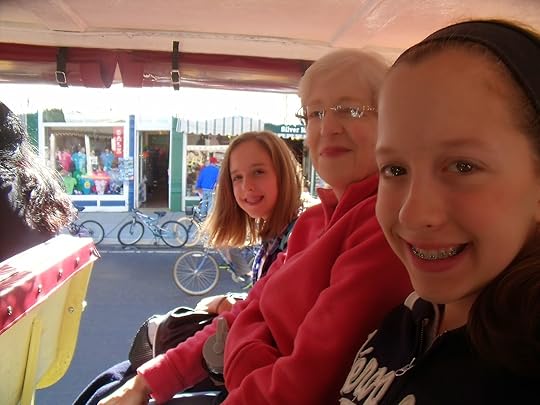
With the breeze blowing off Lake Huron, even on the sunny day, we were actually quite cool and had to use the wool blankets they provided to stay warm during our carriage ride.Our guide for the tour was a history connoisseur of the island which the history buff in me absolutely loved. I learned an incredible amount during the several hours we rode about the island. Here are a few interesting facts:Lilacs aren't native to Mackinac Island. The French brought them over as well as dandelions (which they used for wine)The island is 3 miles wide and 4 miles longMackinac is the old French spelling for the island and Mackinaw is the English versionIn the winter ice forms 3 miles wide around the island, so that it is inaccessible to shipsBecause of the lake effect, it's not unusual to have up to 8 ft. of snow at one time Only a couple of feet of soil cover the island. The rest of the island consists mostly of limestone.During the carriage ride, we stopped at Arch Rock, which is a fascinating rock formation that is in the shape of–you guessed it–an arch. The view of the island from the top of the arch is spectacular. I could see up and down the coast of the island in both directions. It was the perfect place to imagine that I was Angelique MacKenzie (the heroine of Captured by Love). I wanted to get into her mind, fall in love with the island, and see it's amazing beauty and the solidness it offers amidst the seas the surround it.Join me in the next post as I share more about my research trip on Mackinac Island, specifically my visit to the old military fort there.
How about you? Have you ever visited Mackinac Island? What's your favorite thing about the island? And for those who haven't visited, what's your favorite vacation destination?Want to win a book? Enter a Rafflecopter giveaway by July 15th!
 Jody Hedlund is an award-winning and bestselling author of inspirational historical romances. As a busy mama-writer, she has the wonderful privilege of teaching her crew of 5 children at home. In between grading math papers and giving spelling tests, she occasionally does a load of laundry and washes dishes. When she's not busy being a mama, you can find her in front of her laptop working on another of her page-turning stories. She loves reading almost as much as she loves writing, especially when it also involves chocolate and coffee.
Jody Hedlund is an award-winning and bestselling author of inspirational historical romances. As a busy mama-writer, she has the wonderful privilege of teaching her crew of 5 children at home. In between grading math papers and giving spelling tests, she occasionally does a load of laundry and washes dishes. When she's not busy being a mama, you can find her in front of her laptop working on another of her page-turning stories. She loves reading almost as much as she loves writing, especially when it also involves chocolate and coffee.
Published on July 09, 2014 04:00
July 2, 2014
Living vicariously...through YOU? #IWSG
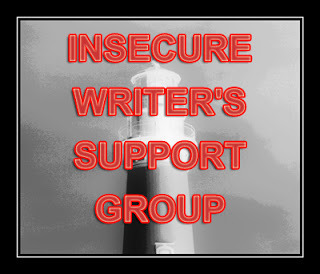
Welcome, fellow Insecure Writers! Click here to sign up for this amazing group.
Do you embark on dangerous missions? Do you wield a sword or rob banks? Me neither. We writers usually leave that sort of thing to the pros...our characters.
On the other hand, my hubby is a risk-taker. He does barrel rolls on his Sky Ski, and jumps triples off the diving board. For his recent birthday, he did a tandem jump out of an airplane.
People may assume I live vicariously through him, but I don't. I have no desire to do those things. Not even a little. My bucket list includes tamer options, like visiting Alaska and Mount Rushmore.
As I watched my hubby hurtle toward the ocean at 120 miles per hour, an idea hit me: some writers may live vicariously through other people, and even through their characters. But what if other people are living vicariously through you, the writer?
Yes, you.
Imagine all the folks out there who want to write down their thoughts, but don't. Or wish they could share stories, but think they can't.
If you're putting words on the page, or on the screen, or in a blog post, you're doing what other people wished they would do. If you've gathered the courage to submit your work, or if you've taken the leap into indie publishing, you're putting your heart and soul out there for others to read and offer judgement. That takes a parachute full of courage.
The next time you feel as if you don't have guts, or that everyone else is wild and adventurous, remember this: others are watching you. They may even be inspired by you. And maybe, just maybe, someone is living vicariously through you.
 (Here's my hubby on his tandem jump)
(Here's my hubby on his tandem jump)Are you a risk taker? Do you live vicariously through someone else? Or do you feel like someone else lives vicariously through you? Have you ever jumped out of an airplane? Is it on your bucket list?
Published on July 02, 2014 04:00
June 25, 2014
Stuck in Your Story? Try Roadmapping!
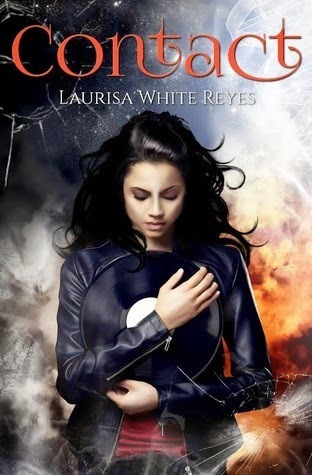
In case you missed it, check out my guest post at Fiction University--Marketing Strategy: The Next Book.
Friends, today we have a guest post by author and editor, Laurisa White Reyes. She's here to share tips about roadmapping. Take it away, Laurisa!
STUCK IN YOUR STORY? TRY ROADMAPPING!By Laurisa White ReyesA friend of mine has been working on his novel for years but has yet to complete it. “I just get bogged down,” he told me recently. “I don’t know where the story is going.”Does this sound familiar?Too many potential writers have partial manuscripts lying around, and I say potential because an unfinished manuscript is nothing more than a good idea—and unless you’re Nora Roberts or Tom Clancy, all a good idea is good for is collecting dust. It will never sell. We all have good ideas. The question is how to turn that brilliant concept for the next bestselling novel into a complete manuscript?Some writers manage to get their novels down by writing as they go, a process called pantsing (referring to writing by the seat of their pants). But this doesn’t work for everyone. If it did, there would be no such thing as writers’ block and no partial manuscripts cluttering our hard drives.The other popular method of writing is called plotting or roadmapping—planning a story in detail from beginning to end before the actual process of writing begins. I’ve written novels using both methods, and each has positive and not so positive aspects. However, for writers who have hit a brick wall, plotting might be just the ticket to put you back on track.KNOW YOUR DESTINATIONWriting is like driving a car. If you were to get behind the wheel without knowing where you want to go, you may very well wander aimlessly around town. You could end up on the same roads you drove down before. Without a destination in mind, you might never leave your driveway at all. Most of us, however, know before we ever get in the car where we plan to go. We look up the address and get directions. We may print a map, or even check the traffic before we head out. Without proper planning, our journey would waste time and cause frustration.Writing a novel is no different. Every story is a journey with a specific destination. Writers can avoid common obstacles such as writers’ block and meandering storylines by knowing their destination and planning the route before they start writing. I call this planning process ROAD MAPPING.ROADMAPPINGRoad Mapping requires patience on the part of the writer. Like the traveler who wouldn’t just jump in his car and take off without knowing where he’s going, so the writer ought not to rush into writing before she’s good and ready. There are four simple steps to Road Mapping. They are: brainstorm, outline, summarize, and chapter breakdown.BrainstormWhen I get a good idea for a novel, I never rush over to the computer and start writing. I may jot down a sentence or two so that I will remember it later, but after that, I let the idea mull around in my brain for awhile. I spend as much time as I need to develop the characters and plot details, often writing my thoughts on sticky notes. I like sticky notes because I can move them around at will, organizing all those seemingly random ideas into a linear storyline across my bedroom wall. This is the time to work out the entire story from beginning to end. Knowing how the story will end is vital. Only once I am certain of my destination will I move on to step number two.OutlineI earned my degree in English eons ago, and I often joke that my diploma has done nothing for me but line the bottom of my hope chest. However, I did glean one very useful skill from all those years of study. I know how to write an outline. In high school and college, I had to write outlines for countless essays. (You probably did, too.) Later, as a newspaper and magazine columnist, I wrote outlines for the articles I published. An outline is perhaps the easiest way to visualize an entire novel from start to finish on a single piece of paper. Just as with any 5 paragraph essay, I break the story down into 5 sections: the hook (how my story begins), 3 plot points (these are the three biggest moments of conflict in a story—much like you’d find in a movie screenplay), and the conclusion (how the story ends—the destination).SynopsisOnce my outline is finished—what I refer to as a story’s skeleton—I am ready to flesh it out in my synopsis. This is where the actual writing process begins. I describe the characters and storyline using complete sentences and paragraphs and plenty of detail. It is almost like writing a short story version of my novel. This can take anywhere from three to twenty pages, and can be used later when submitting to agents and publishers.SummarizeThe final step is to breakdown the entire novel into individual chapters or scenes. Each chapter is assigned a number and a title that reflects what occurs in that chapter. The titles are for quick reference while writing and revising the manuscript and are eventually deleted from my completed manuscripts. I include a brief (no more than a paragraph) description of the setting, events and conflict for each chapter.LET THE WRITING BEGINOnce these four steps are complete, I am ready to write my novel. I like to write at least 500 words per day, but I don’t always write scenes in order. By referring to the chapter summaries, I can choose any chapter I like and write that one. I save each chapter as a separate file using the chapter number and title as the file name. (ie. 01-Exile; 02-Found; ect.) Later, if I need to rearrange the chapter order, all I need to do is rename the files.IN CONCLUSION
Getting to the end of a story is not as daunting a task as it may seem. All it takes is a little pre-planning. Know your destination. Take the time to plan your route. Then pull out that incomplete manuscript, blow off the dust, and GET IT DONE.Great advice, Laurisa! Thanks for sharing your process. I'm a big fan of plotting.
Friends, are you pantsers? Plotters? Do you know your ending before you start writing? Have you ever tried roadmapping?
Wanna win a copy of Contact? Enter a Rafflecopter giveaway!
Laurisa White Reyes is the author of three published novels: The Rock of Ivanore, The Last Enchanter (books 1 & 2 of The Celestine Chronicles) and Contact, a young adult thriller that just came out this week. She is also the Editor-in-Chief of Middle Shelf, a digital book review magazine for middle grade readers.
Published on June 25, 2014 04:00
June 18, 2014
Writing lessons learned from HIGH AND DRY
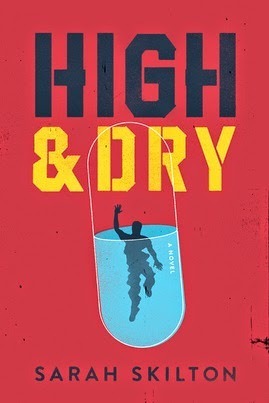
I recently read High and Dry, a noir YA novel by Sarah Skilton. It was a fun, dark, gritty read. Full disclosure: Sarah Skilton is a buddy of mine. But believe me, I'm not saying nice things about the book because Sarah's my friend. I speaketh kind words because they're the truth.
First, a quick look at High and Dry (from Amazon):
Framed for a stranger's near-fatal overdose at a party, blackmailed into finding a mysterious flash drive everyone in school seems anxious to suppress, and pressured by his shady best friend to throw an upcoming match, high school soccer player Charlie Dixon is juggling more than his share of drama. Add in a broken heart and the drinking he's been doing to soothe it, and he's near the breaking point. In this fast-paced, layered mystery, Charlie spends a frantic week trying to clear his name, win back the girl of his dreams, and escape a past friendship that may be responsible for all his current problems.
Now on to the writing lessons learned. Warning: if you haven't read the book yet, and don't want to know any plot points, read no further!
Begin with voice and character: Skilton's novel begins with a great first line. "I wasn't invited, but I showed up to the party anyway so I could talk to Ellie Chen and find out why she dumped me two weeks ago." Already we know the main character has attitude, and that he doesn't mind breaking rules.Create empathy for the anti-hero: Charlie Dixon's internal dialogue makes readers care for him. Yes, he's drinking. Yes, he crashed a party. But we know why--his heart is broken because of a bad break up. Teens (and most adults) can totally relate.Motive for blackmail: Blackmail happens, and in fiction, it has to be totally believable. Why would someone blackmail Charlie Dixon? His mom was tasked with school reform and become Enemy #1 in their small desert town. This may or may not be the real reason why Charlie is blackmailed, but he assumes it has something to do with his current predicament.Fun slang for only this story: Skilton came up with fun terms used by kids at the high school. Cliques within the school were known as Song Birds (girls' choir), Dot Govs (student council), and Beckhams (soccer players), to name a few. Skilton wrote a great post over at Janice Hardy's blog about Slinging Slang: The Case for Made-Up Words.Believable reason to do the wrong thing: Charlie Dixon does many questionable things, but these actions make sense in context. Characters do bad things all the time, and if the reasons are believable, the reader will forgive them--and even root for them.Create a cast of suspects: Sheesh, Skilton's book was packed with suspects. Even walk-on characters had dirt under their nails, which kept things interesting.Have you read High and Dry yet? What's your opinion on these writing lessons? Have you used any of these tips before? Any you'd like to add?
Published on June 18, 2014 04:00
June 11, 2014
Inspiration for Writers (and Graduates!)

Last week we learned that our son was Salutatorian of his 8th grade class. Pretty darn cool. We also learned he had to write a speech over the weekend.
He wanted to write his own speech, which I totally respected. I did help with editing, and with finding inspirational quotes for him to work with. As I read these quotes, I realized they not only applied to business folks, graduates, and life, they applied to writers as well.
I hope they inspire you as much as they inspired us!
I've missed more than 9,000 shots in my career. I've lost almost 300 games. Twenty-six times I've been trusted to take the game-winning shot and missed. I've failed over and over and over again in my life. And that is why I succeed. -- Michael Jordan
Twenty years from now you will be more disappointed by the things that you didn't do than by the ones you did do, so throw off the bowlines, sail away from safe harbor, catch the trade winds in your sails. Explore. Dream. Discover. -- Mark Twain
Winning isn't everything, but wanting to win is. -- Vince Lombardi
Whether you think you can or you think you can't, you're right. -- Henry Ford
Everything you've ever wanted is on the other side of fear. -- George Addair
Your time is limited, so don't waste it living someone else's life. Don't be trapped by dogma--which is living with the results of other people's thinking. Don't let the noise of others' opinions drown out your own inner voice. And most important, have the courage to follow your heart and intuition. They somehow already know what you truly want to become. Everything else is secondary. -- Steve Jobs
When I stand before God at the end of my life, I would hope that I would not have a single bit of talent left and could say, I used everything You gave me. -- Erma Bombeck
Which quotes did my son choose? Um, none of these. He chose the wise words of Spongebob Squarepants and Hannah Montana. After all, he's fourteen.
Have you ever written a graduation speech? Did these quotes spark something within you? Any cool quotes you'd like to share?
Published on June 11, 2014 04:00
June 4, 2014
Kindness: Pay it Forward #IWSG
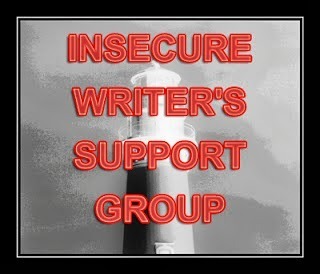
Welcome, insecure writers! If you haven't joined this amazing group yet, clicky here and go for it. You won't be sorry.
On Memorial Day weekend, a Vacaville, CA fire crew was buying groceries at the store. Before they were able to pay, they got an emergency call and had to leave. When they returned, a paid receipt was given to them with these words written on it: "Firefighters, thanks for being there for us! Have a good weekend." It was signed by an Air Force wife. The firefighters then used the money they saved and paid it forward. Click here for the whole story.
Cool, right?
My sons' sixth grade teacher read my book and took the time to send an email that brought tears to my eyes. I told him I'd save the email and read it on days when I'm struggling. His kind words meant the world to me.
These acts of kindness remind me that the simplest gestures can often mean the most. We're all capable of giving kindness, and we're thankful to receive it. In a world that sometimes seems off kilter, it's nice to know kindness remains one of the greatest gifts of all.
The writing community overflows with kindness. How can we pay it forward? Here are a few ideas:
Encourage a fellow writer who's feeling discouraged (this group is THE place for that)Remind a writer to persevereOffer positive remarks when giving a critiqueRemind fellow writers why they started writing--don't lose the joy!When we hear good news, spread the word and offer praiseAt a conference, invite other writers to sit beside you or at your table
Kindness is one of those rare gifts that when you give it away, it seems to find its way back to you.
Have you witnessed random acts of kindness? Do you have other "pay it forward" ideas you'd like to share?
Published on June 04, 2014 04:00
May 28, 2014
Novels in Verse: Tips and Encouragement from Elana Johnson
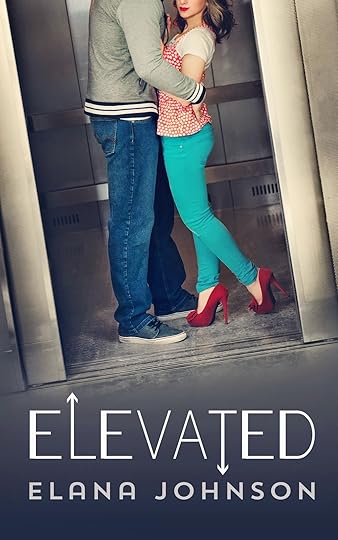
Friends, today the queen of queries and all around nice person, Elana Johnson, is here to share helpful tips about writing. But we aren't talking about query letters. We're chatting about novels in verse.
I downloaded Elana's YA verse novel, ELEVATED, and absolutely loved it. After I read the final page I asked Elana a few questions about writing in verse and indie publishing. She generously shares her experience with us.
Before we get to the interview, here's a summary of Elevated:
The last person seventeen-year-old Eleanor Livingston wants to see on the elevator—let alone get stuck with—is her ex-boyfriend Travis, the guy she's been avoiding for five months.
Plagued with the belief that when she speaks the truth, bad things happen, Elly hasn’t told Trav anything. Not why she broke up with him and cut off all contact. Not what happened the day her father returned from his deployment to Afghanistan. And certainly not that she misses him and still thinks about him everyday.
But with nowhere to hide and Travis so close it hurts, Elly’s worried she won’t be able to contain her secrets for long. She’s terrified of finally revealing the truth, because she can’t bear to watch a tragedy befall the boy she still loves.
1. What made you decide to write ELEVATED in verse?
I had started writing it in regular prose. I had over 100 pages! But something with the story wasn’t right. For one thing, it wasn’t long enough. I couldn’t figure out the ending. And then I started reading verse novels, and I thought, “I wonder if I can try writing a verse novel.”
And so I did. I read a few more of them, did a little research online, and then decided to stretch myself and write in this new form. I went immediately to ELEVATED – this unfinished, sort of dead-in-the-water story – and transformed it into a novel in verse.
The form worked really well for the kind of novel it is, and I just knew: the reason it didn’t work the first time was because I was writing it wrong.
2. Had you written in verse before? How did you learn how to do it?
No, I had never written in verse before. I did a little research online about free verse, and form, and things like that. Then I just dove into it, writing by “feel,” basically. Reading out loud also helped me get the poetic rhythms I was going for.
3. What surprised you most about writing in verse?
How much you can say with hardly any words. I am working on another verse novel right now, and I’m still surprised at how much I don’t have to say to get the same story across.
4. Tell us about your decision to indie publish ELEVATED.
ELEVATED went out to New York editors in the spring of 2013. It was received pretty well, getting a lot of enthusiastic responses. A few editors passed it to their higher-ups, and acquisitions meetings were held. But in the end, no one bought it. There were varied reasons, but it came down to the verse market being “soft.” They had other verse novels they’d already purchased, blah blah blah.
But I felt that it was a good book (but I’m biased, because I’m the author! Ha!), and that just because one of the New York houses didn’t want it didn’t mean it shouldn’t be published. It was also a book I believed in, that I loved writing, and I still love reading. So I decided that I should self-publish it.
5. What advice can you offer writers who are considering a novel in verse?
Do it! Do it now! The only thing you’ll gain is an increased appreciation for the written word, and maybe you’ll stretch and grow as an author in ways you don’t expect. So do it!
6. Any advice you can offer writers who want to indie publish?
Do it! Do it now! Haha. But I have loved my self-publishing journey. I loved doing the cover, formatting the interior, all of it. I still hope there’s a spot for my books in the traditional market, but for those titles that I am passionate about that don’t get placed there, I will be self-publishing them.
Friends, I found this information totally fascinating. I love verse novels, but I've been too chicken to try it. Now maybe I will!
Have you ever written in verse? Do you read verse novels? Would you object to indie publishing stories that haven't found a publishing home?
 Elana Johnson’s work, including Possession, Surrender, Abandon, and Regret, published by Simon Pulse (Simon & Schuster), is available now everywhere books are sold. Her popular ebook, From the Query to the Call, is also available for free download, as well as a Possession short story, Resist. School teacher by day, Query Ninja by night, you can find her online at her personal blog or Twitter. She also co-founded the Query Tracker blog, and contributes to the League of Extraordinary Writers
Elana Johnson’s work, including Possession, Surrender, Abandon, and Regret, published by Simon Pulse (Simon & Schuster), is available now everywhere books are sold. Her popular ebook, From the Query to the Call, is also available for free download, as well as a Possession short story, Resist. School teacher by day, Query Ninja by night, you can find her online at her personal blog or Twitter. She also co-founded the Query Tracker blog, and contributes to the League of Extraordinary WritersAmazon * Barnes and Noble * Kobo * iTunes * Goodreads
Published on May 28, 2014 04:00
May 21, 2014
Writing lessons learned from DIVERGENT
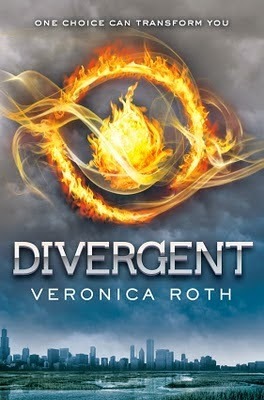
Obviously I'm a bit slow, because I finally just read Divergent, by Veronica Roth. As a matter of fact, I broke my own rule and saw the movie first--only because I was part a group of 9, and they all wanted to see that movie. Because I saw the movie first, I almost didn't read the book. But I'm so glad I did. It's amazing.
Fun fact:
Here's a quickie description from Goodreads:
In Beatrice Prior's dystopian Chicago world, society is divided into five factions, each dedicated to the cultivation of a particular virtue--Candor (the honest), Abnegation (the selfless), Dauntless (the brave), Amity (the peaceful), and Erudite (the intelligent). On an appointed day of every year, all sixteen-year-olds must select the faction to which they will devote the rest of their lives. For Beatrice, the decision is between staying with her family and being who she really is--she can't have both. So she makes a choice that surprises everyone, including herself.
Here are some cool writing lessons I learned from Divergent. Warning! If you haven't read this book, and don't want to know any plot points, read no further :)
The world is the way it is--The book opens in futuristic Chicago. Factions were created to keep the peace. The author didn't bog the story down with long-winded explanations of why the world is the way it is. It just is. She trusts the reader to accept it the way it is, knowing more information will follow. I liked that.Not all parents are lame--In some YA lit, parents are idiotic, horrible, or lame walk-on characters. Which makes sense, because in real life some parents are idiots, horrible, or lame. Not so in Divergent. Tris loves her family and longs for them. Her parents are portrayed as noble badasses. Veronica Roth's dedication reads, To my mother, who gave me the moment when Beatrice realizes how strong her mother is and wonders how she missed it for so long.Don't rush romance--In many books, especially romance, it's important to introduce the love interests right away and start cookin'. In this YA dystopian, it was appropriate to make the reader wait, especially since the romance is a subplot. The romance with Four was a slow burn but totally worth the wait. *sigh*Unique inner dialogue--While reading this book, I noticed Tris' inner dialogue was unique: she doesn't use contractions. We make our characters unique when we attach identifying quirks, dialogue tags, and inner thoughts.Physical growth matches inner growth--Tris' body morphs from weak and skinny to lean and muscular, just as her character is changing from fearful newbie to brave leader. It was a cool parallel that physically illustrated her character growth.Story problems widen beyond the main character's initial worries--Tris' story problems change and grow. At first she worries about leaving her parents. Then she worries about her rank, and surviving Dauntless training. But then BAM! Those worries are swept away when war leaps to the top of her worry list.The print version also had fun back matter, like the faction manifestoes, details on how the author came up with faction names, and topics for discussion.
What do you think of these writing lessons? Have you used any in your own fiction? Have you read Divergent? What did you think of it? And a fun question: which faction would you choose?
Bonus tip: has anyone else been having trouble receiving blog posts via email? For about three weeks I didn't receive my own blog posts, and many others, in my email inbox. After some digging, I found this forum thread. I made a couple of adjustments and now I'm back in business. I hope the link is helpful!
Published on May 21, 2014 04:00
May 14, 2014
What is writer's block secretly telling you? Wit and wisdom from bestselling author Jamie Ford
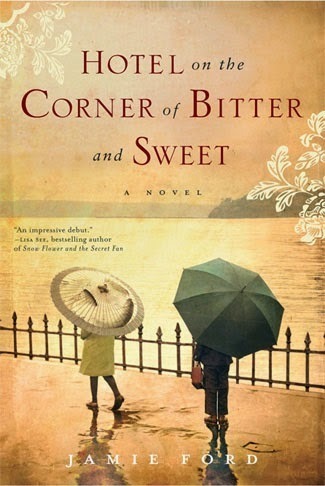
Guys, I am sooooooo lucky to have this special guest today. Jamie Ford, New York Times bestselling author of Hotel on the Corner of Bitter and Sweet and Songs of Willow Frost, is HERE. On my blog!!!
First, let me remind you of a couple of posts regarding Jamie Ford (not that I'm a creeper or anything). I wrote about the writing lessons I learned from Hotel on the Corner of Bitter and Sweet here. I also wrote about how Jamie Ford inspired me as an author.
Jamie Ford is a super nice guy, and was kind enough to answer some questions of interest to writers. Enjoy!
Julie: Jamie, what is the best piece of writing advice you ever received? Why did it resonate with you?
Jamie Ford: A friend once told me, “Writer’s block is your subconscious telling you that what you’re working on actually sucks.”
I’ve found that to be painfully, painfully true. When I get writer’s block, it’s usually because deep down I know I’ve strayed from where the story needs to go. When that happens, I back up, revisit the taproot of the story, and find another path.
(Great advice. And he’s still a friend!)
Julie: Can you tell us a bit about your writing process? Plot first? Character development first? Research first?
Jamie Ford: Hmmm…I wish I had some Hunter S. Thompson-esque writing process to share—you know, wake up in a jail cell, get bailed out by a showgirl, go sit at the racetrack where I bet and drink all day while banging away at a manual Olympia, using my loaded .38 Special as a paperweight.
But, the reality isn’t quite so sexy. Typically I start with a very simple premise, I figure out my beginning and my ending (the ending us uber-important), I do a ton of research, and then I write, usually from 8:00 AM – Noon. I edit late in the day. That’s about it. Once in a while I’ll grab a triple latte and go buck-wild by writing at the public library.
Julie: Your novels grab the heart and won't let go. How do you create characters and stories that pull readers in and make them care?
Jamie Ford: This is when it’s beneficial to be a sentimentalist, because it takes one to know one, to understand one, and to tell those kinds of stories. Great if you’re a writer penning complicated, emotional, familial stories. Not so great if you’re a brooding, whining, angst-ridden teenager. The running joke in my family is that if I formed a heavy metal band in my youth it would have been called Melancholica. I guess I just grew into my emotions and put them to purposeful use in fiction.
Melancholica! I love that. Big thanks to Jamie Ford for visiting my blog and sharing his wit and wisdom with us.
Friends, what do you think about Mr. Ford's reference to writer's block? His writing process? And creating characters and stories that grab a reader's heart?
His novels are amazing. Wanna pick up copies? Clicky clicky below.
Hotel on the Corner of Bitter and SweetSongs of Willow Frost
Published on May 14, 2014 04:00
What is writer's block secretly telling you? Witty advice from bestselling author Jamie Ford

Guys, I am sooooooo lucky to have this special guest today. Jamie Ford, New York Times bestselling author of Hotel on the Corner of Bitter and Sweet and Songs of Willow Frost, is HERE. On my blog!!!
First, let me remind you of a couple of posts regarding Jamie Ford (not that I'm a creeper or anything). I wrote about the writing lessons I learned from Hotel on the Corner of Bitter and Sweet here. I also wrote about how Jamie Ford inspired me as an author.
Jamie Ford was kind enough to answer some questions of interest to writers. Enjoy!
Julie: Jamie, what is the best piece of writing advice you ever received? Why did it resonate with you?
Jamie Ford: A friend once told me, “Writer’s block is your subconscious telling you that what you’re working on actually sucks.”
I’ve found that to be painfully, painfully true. When I get writer’s block, it’s usually because deep down I know I’ve strayed from where the story needs to go. When that happens, I back up, revisit the taproot of the story, and find another path.
(Great advice. And he’s still a friend!)
Julie: Can you tell us a bit about your writing process? Plot first? Character development first? Research first?
Jamie Ford: Hmmm…I wish I had some Hunter S. Thompson-esque writing process to share—you know, wake up in a jail cell, get bailed out by a showgirl, go sit at the racetrack where I bet and drink all day while banging away at a manual Olympia, using my loaded .38 Special as a paperweight.
But, the reality isn’t quite so sexy. Typically I start with a very simple premise, I figure out my beginning and my ending (the ending us uber-important), I do a ton of research, and then I write, usually from 8:00 AM – Noon. I edit late in the day. That’s about it. Once in a while I’ll grab a triple latte and go buck-wild by writing at the public library.
Julie: Your novels grab the heart and won't let go. How do you create characters and stories that pull readers in and make them care?
Jamie Ford: This is when it’s beneficial to be a sentimentalist, because it takes one to know one, to understand one, and to tell those kinds of stories. Great if you’re a writer penning complicated, emotional, familial stories. Not so great if you’re a brooding, whining, angst-ridden teenager. The running joke in my family is that if I formed a heavy metal band in my youth it would have been called Melancholica. I guess I just grew into my emotions and put them to purposeful use in fiction.
Melancholica! I love that. Big thanks to Jamie Ford for visiting my blog and sharing his wit and wisdom with us.
Friends, what do you think about Mr. Ford's reference to writer's block? His writing process? And creating characters and stories that grab a reader's heart?
His novels are amazing. Wanna pick up copies? Clicky clicky below.
Hotel on the Corner of Bitter and SweetSongs of Willow Frost
Published on May 14, 2014 04:00



